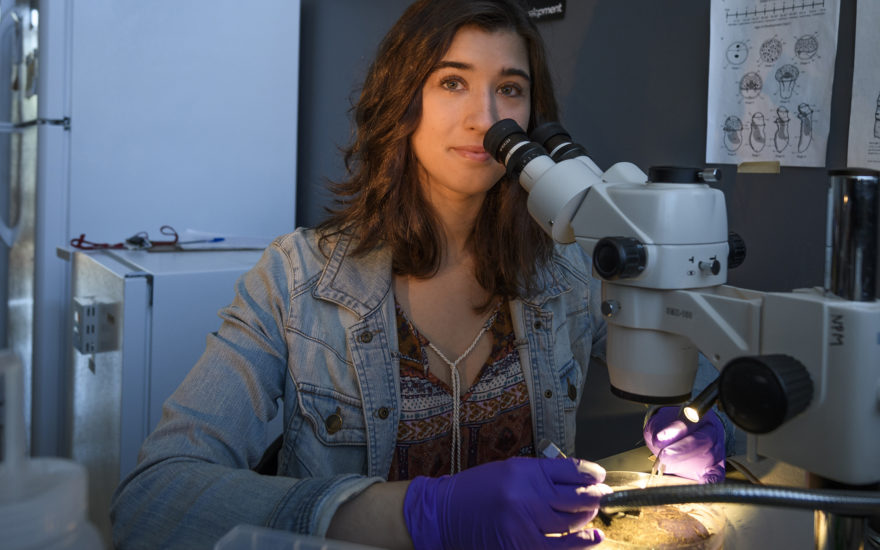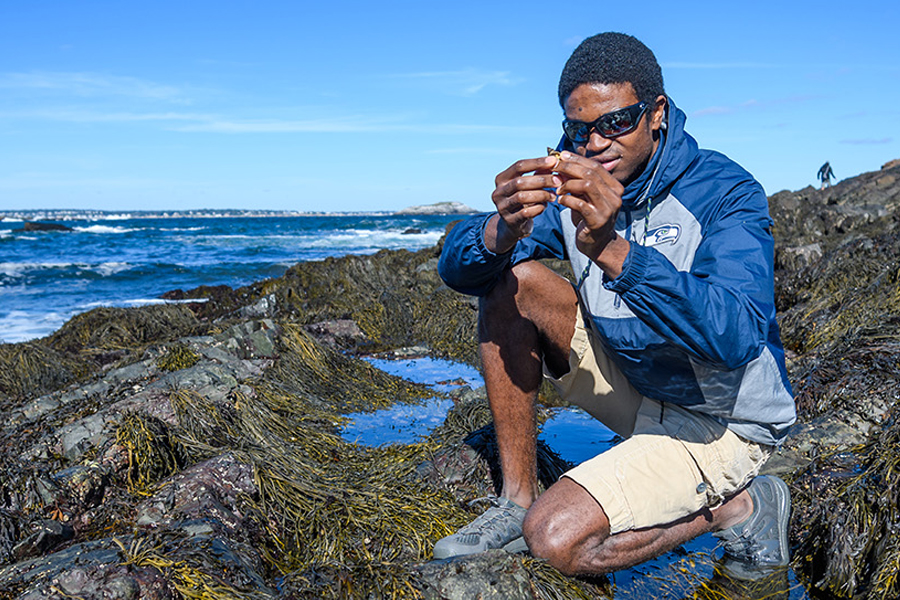Biology is the study of life at all levels: molecular, cellular, individual, ecological, and systemic. Thanks to our hands-on approach to learning, the building blocks of all life — from amoebas to zebras, plants to people — will become your own real-world explorations.


Why study biology at Clark?
- Delve into diverse subfields of biology, including ecology and evolution, molecular and cell biology, marine biology, conservation biology, botany, neuroscience, and animal behavior.
- Conduct research in Clark’s LEED Gold-certified Lasry Center for Bioscience, a state-of-the-art, 50,000-square-foot facility, and use specialized biology research equipment normally found only in much larger departments.
- Benefit from a wealth of other experiential learning opportunities, from internships in industry labs to summer research fellowships to study abroad programs.
- If you’re interested in a health-related career, chart your course with the guidance of our Prehealth Advising Program.
4 + 1—An advanced degree within reach
The 4+1 Accelerated Master’s provides an opportunity to earn a pathway to a master’s degree — with one year of additional study and available tuition scholarships. Consider the following option for this major:
- Apply
- Request Info
Are you ready to take the first step?
Featured Courses

Ecology of Atlantic Shores
Get your feet wet developing skills in field ecology in this course on Atlantic flora and fauna. You’ll focus on two locations: the rocky intertidal zone along the local Atlantic coastline and the island of Bermuda.

The Genome Project
Perform scientific research and develop genomics skills by piecing together the entire DNA blueprint of an organism by using computational and molecular biology.

Animal Locomotion
In our lab you’ll use high-speed video to analyze the mechanics of animal locomotion.
You’ll begin the major by obtaining a broad foundation in biology before choosing an area of focus (e.g., cell and molecular biology, ecology and evolution, among others), or the pre-health careers track. In consultation with your faculty adviser, you’ll select courses appropriate to your area of specialization. You should include one course that develops research techniques in biology, a seminar course, and a capstone experience, which can be an upper-level research course, internship, or directed research (on or off campus).
Curriculum update
Effective fall 2025, Clark offers new majors a B.S. in Biology instead of a B.A. Contact your advisor for details.
Career Communities are industry-focused groups designed to support your professional exploration and narrow down your career interests within specific fields. You’ll connect to opportunities, professionals, and information that will support your career development. The following communities may be of interest for students in this major:
Health Professions and Life Sciences
Science, Data Technology
Sustainability, Climate, and Global Change
Physician, Internal Medicine
St. Vincent hospital, Worcester, MA
Health Care Consultant
Ernst & Young
Associate Scientist
Pfizer Pharmaceutical
Radiologist
S&D Medical
Fisheries Technician
Lake Tahoe Basin
If you’re considering a career teaching biology at the high school level, we encourage you to check out the Noyce Scholarship program. A robust Prehealth Advising Program is available if you’re interested in pursuing a career in the health professions.
The Clark Experience
The Clark Experience brings together the exceptional education you’ll receive in the classroom and so much more. Through focus and flexibility, it ensures you’ll leave Clark with the creativity, confidence, and resilience to succeed and lead a life of meaning and consequence.
Frequently Asked Questions
What can I do with a major in biology?
At Clark you’ll get more than a great education; you’ll also be prepared for a long, productive career and life of consequence. And once you’ve completed your degree, you can join other Clark alumni who have gone on to work for great organizations and attend some of the best graduate schools in the world.
The biology major prepares you for a variety of exciting next steps. You might go on to graduate school to further your knowledge of the field, enter one of the health professions (medical, dental, or veterinary), or become a public school teacher. Other career paths include biomedical research, biotechnology, environmental science, conservation biology, and forestry.
What skills will I learn as a biology major?
- How to design a hypothesis, and collect and interpret relevant data
- How to communicate information, both orally and in writing
- How to work as part of a team
What biology labs and facilities are available?
Learn about biology facilities and equipment available for teaching and research, and the resources at Clark’s Carlson Science Library.
Are there academic achievement award available for biology majors?
M. Margaret Comer Memorial Award for Undergraduate Studies in the Biological Sciences
The M. Margaret Comer Award for Undergraduate Research was established by Clark University in memory of Professor Margaret Comer, a member of the Clark faculty from 1976 to 1992. Upon Professor Comer’s unexpected early death, the University decided to recognize her “extraordinary personal commitment to exacting scientific research” by annually supporting an undergraduate who demonstrates achievement or high potential in biology or biochemistry research.
The David Potter Award for Excellence in Biology
The Potter Award was established by Dr. and Mrs. Warren Litsky, AB ’45 in honor of Botany Professor David Potter. This fund is used to provide a prize to an outstanding senior biology major.
Is there an honors program in biology?
During your junior year, you might be accepted into the biology honors program. Joining the program means you’ll work closely with a professor to create a thesis on a topic of your choice. Examples of recent honors thesis topics are:
- Characterization of British Columbia Threespine Stickleback (Gasterosteus aculeatus)
- Identification of the Potential Zinc Finger Motif in Dictyostelium discoideum Ima1 Protein
- Investigating the Role of CG4096 in the EGFR Signaling Pathway
- Copy Number Variation in the Fungal Pathogen Cryptococcus gattii
Diversification of Gene Families Involved in Fruiting Body Development in Agaricomycetes Inferred Using Comparative Genomics
Be a force for change.
Come study at a small research university with a strong liberal arts core.

